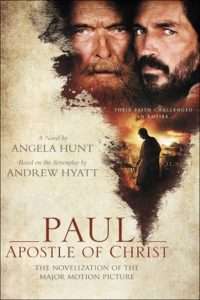Sponsored
The best-selling novelist talks about the challenges and privilege of detailing the final days of the influential apostle.
To accompany the theatrical release Paul, Apostle of Christ, novelist Angela Hunt brings her expertise as a historical novelist to create a companion novelization. Two men—Paul and Luke—struggle against a determined emperor and the frailties of the human spirit to bequeath the gospel of Jesus Christ to the world. In this interview, Angela shares the value a storyteller can bring to the historical account, the parallels she sees between ancient Rome and modern America, and what readers can learn from Paul, Apostle of Christ…
 Sometimes people are confused by the idea of biblical fiction. What does a novelist bring to the table that you can’t get from just reading the original scripture?
Sometimes people are confused by the idea of biblical fiction. What does a novelist bring to the table that you can’t get from just reading the original scripture?
The biblical authors were not novelists. They wrote facts, events, and dates from their perspective as they were moved by the Spirit of God. When they recounted events, however, they tended to write sparely.
A trustworthy biblical novelist takes the scripture and brings it to realistic life—with layers of color and texture and sensory details. We research the historical period, and read dozens of works written in that time period whenever possible, so we can get a feel for how people actually wrote, lived, and spoke.
When we encounter conflicting expert opinions, we choose the most logical. We consider human nature, which does not change. People still get angry, frustrated, and depressed. Even biblical characters make awful mistakes, and if the Bible doesn’t avoid recording them, why should a novelist?
A trustworthy author will not violate Scripture. We keep the scriptural account as our touchstone, but the parts that spring from our imagination, we freely admit are fiction.
Why is it important to use narrative to flesh out these historical accounts?
God Himself recorded stories, since humans are hard-wired to appreciate story. Who would know that better than the God who created us?
Jesus used stories to teach His followers–that’s what the parables were. Through the work of the Spirit, some people caught the true meaning of Jesus’ stories, and others didn’t.
The Bible gives us all we need to know about God, but it does not give us all we want to know—we yearn to know more. Historical fiction helps us better understand the culture and history of familiar story events.
Biblical fiction readers always want to know how much of the novel is true and how much is fiction.
In my biblical fiction—in all my historical fiction, really—I take pains never to contradict the historical record. And since the Bible is the alpha historical record, I took great pains not to contradict anything in it.
Your historical novels often include a bibliography at the end…
Because it’s so easy for readers to assume that I simply made things up. I started my career as a nonfiction writer, so everything I write is based in reality. Novels may not be actual, but I believe they should deal with facts and truths. The “fictional” parts that I create have their roots in facts, logic, and probabilities.
Click through to find out what research went into the story…


